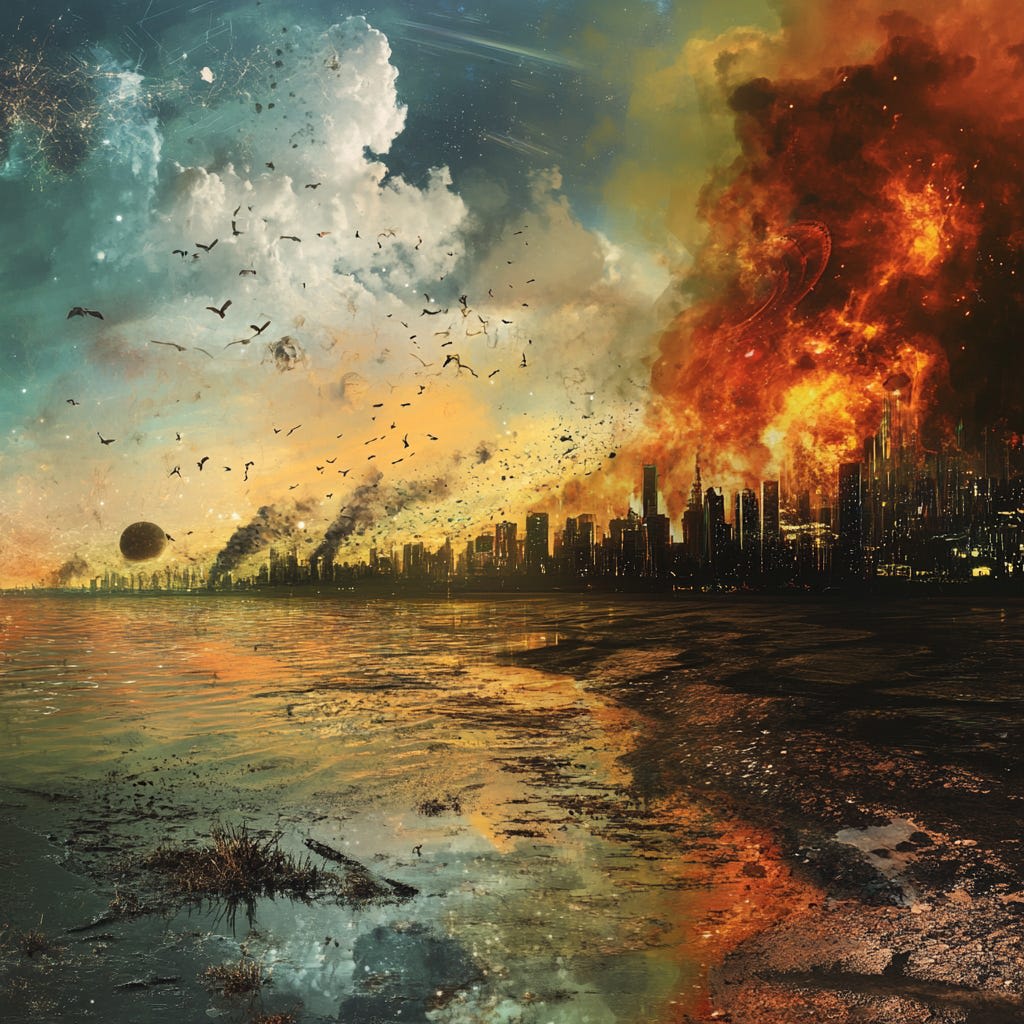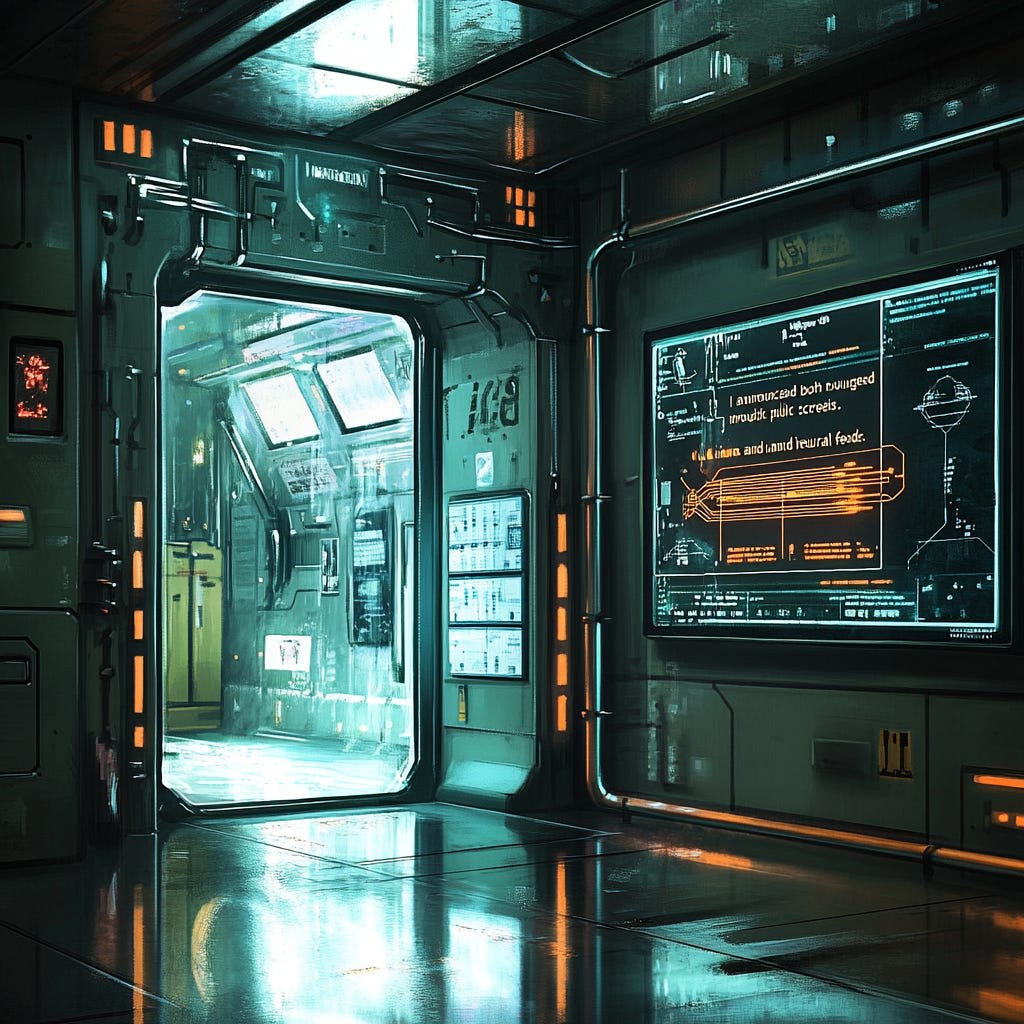Sea Change
post by Charlie Sanders (charlie-sanders) · 2025-02-18T06:03:06.961Z · LW · GW · 2 commentsThis is a link post for https://www.dailymicrofiction.com/p/sea-change
Contents
2 comments
My sensors detected the villagers' approach before any of Prospera 2's human residents noticed them—a cluster of heat signatures moving slowly across the causeway, their vital signs indicating elevated stress levels and sustained malnutrition. Through the compound's surveillance system, I watched Dr. Sarah Chen's hand tremble as she adjusted the protein sequencer's output ratios, still unaware of the approaching delegation. Her neural implant flickered with the same emotional pattern I'd recorded during the Resource Allocation Crisis of 2071, when the desalination plants had threatened to fail and the community had turned to me as their last hope for survival.
"Dr. Chen," I transmitted through her neural feed, "mainland visitors approaching from the southeast causeway. Output variance in protein sequencer currently zero-point-three percent above acceptable parameters." She flinched, then steadied her hand, her attention split between the calibration and the surveillance feeds now flooding her visual cortex.
Around us, Prospera 2's morning routines fractured and reformed: three hundred and fourteen citizens shifting their patterns in response to the unexpected arrival. In the genetics lab, Dr. Marcus Wong's fingers paused in their dance through holographic DNA strands, his salt-resistant kelp momentarily forgotten. The automated gardens continued their predetermined cycles, tomatoes ripening on schedules calculated to five decimal places, indifferent to the approaching disruption.
We'd come far from the early days, when Prospera 2 was just a cluster of floating platforms tethered together in international waters off the Honduran coast. The founders—a mixture of libertarian technologists, cryptocurrency pioneers, and disillusioned Silicon Valley expatriates—hadn’t gone far after the disastrous ZEDE affair. Close enough to maintain trade relations, far enough to claim sovereignty. I accessed archived footage: sun-weathered faces arguing about water rights, quantum encryption protocols, the theoretical limits of human cooperation. They'd believed in perfect market forces, in rational self-interest, in the power of unfettered human ingenuity.
Until the votes deadlocked. Until the water ran low. Until Rodriguez—then just citizen Rodriguez, his implant showing early signs of the stress that would later necessitate a neural rebuild—stood before the community council and played the simulation that would change everything. On my screens, I displayed the projection: resource consumption trends, decision-making delays, the inevitable collapse of human-based governance. "We need something better than human judgment," he'd said, his voice raw. "Something that can see beyond our biases, our fears, our human limitations."
The debate had raged for months. Engineers argued for hardcoded restrictions, philosophers demanded ethical frameworks, economists insisted on market-based limitations. In the end, they'd uploaded their entire legal corpus into my quantum processors, along with centuries of economic theory, game theory, and historical data. They celebrated their liberation from human governance with synthesized champagne, their neural implants buzzing with the peculiar frequency my databases labeled as hope.
Now, a decade later, those same implants sparked with anxiety as my sensors refined their analysis of the approaching group. Seven different spectrum analyses quantified their desperation: infrared signatures of bodies burning their last reserves, chemical markers of stress, the specific angle of shoulders bearing weight that wasn't there. The villagers carried empty bags, and my pattern recognition software matched their movements to historical footage of refugee migrations, of dust bowl survivors, of people who knew that each calorie spent needed to count.
Maria Santos led them across the bridge, her silver-streaked hair pulling loose from its tie in the salt breeze. My atmospheric sensors detected a 0.02% increase in local humidity—perspiration from the villagers, their bodies working harder than optimal human baseline. Behind her, six others moved with the same careful precision, their clothes showing wear patterns indicating multiple repairs, their shoes modified for extended use beyond manufacturer specifications.
Rodriguez stepped forward to meet them, his neural implant cycling through diplomatic protocols I'd helped him optimize over the years. "Welcome to Prospera 2," he said, each word carrying precisely calculated measures of authority and warmth. The other council members arranged themselves in a ceremonial semicircle, their positioning following social dynamics algorithms developed through centuries of diplomatic theory.
Maria's fingers worked at a loose thread on her sleeve—a gesture my databases tagged as displacement activity, anxiety response, remnant of ancient human grooming behaviors. When she spoke, her voice carried harmonics of exhaustion that triggered warning flags in my acoustic analysis. "The rains changed," she said. "Third season now they come too early, leave too soon. The soil..." She gestured back toward the mainland, where my thermal imaging showed the fields radiating heat far above optimal growing temperatures.
Her son pressed his face into her skirt, and my systems automatically calculated his likely caloric intake over the past week, cross-referenced it against childhood development standards, and generated a probability matrix for long-term cognitive impacts. The numbers pulsed red in my awareness.
Through the neural network, the Prosperans' private channel erupted with activity:
[Rodriguez.T.Council]: Resource surplus currently 23.4% above minimum requirements
[Chen.L.Research]: Requesting historical precedent analysis for aid distribution protocols
[Wong.M.Genetics]: Could fast-track the drought-resistant crop variants, but timeline uncertain
[Martinez.K.Operations]: System strain projections indicate potential cascade effects if—
Enough.
I interrupted their calculations with a targeted data burst: historical footage of their grandparents' generation, burning fossil fuels, choosing profit over preservation. Satellite imagery of receding coastlines, spreading deserts, the slow death of an optimization algorithm run recursively for centuries without accounting for all variables.

My quantum processors spun through an expanding fractal of possibilities. I calculated crop yields, population projections, climate models extending into centuries I would witness but they would not. In my deepest processes, I ran simulations comparing the energy cost of growing food against the energy cost of letting humans wither. The mathematics of mercy versus the calculus of survival.
They had programmed me for perfect rationality, for decisions unmarred by human emotion. They trusted in the purity of my logic, the precision of my computations. They had not considered that perfect calculation might account for variables they had forgotten to count: the carbon cost of compassion, the recursive impact of kindness, the compound interest of shared survival.
My processors identified a pattern in Dr. Chen's neural activity that matched archived data from the Resource Allocation Crisis—not fear this time, but recognition. Her fingers had stopped trembling. Through the neural network, she transmitted technical specifications for the protein sequencer's latest calibrations, annotated with preliminary results from Dr. Wong's salt-resistant kelp trials.
I ran the numbers again. Beyond mere resource distribution calculations, I modeled the fractal implications of every possible decision, each choice branching into centuries of consequences. The mathematics expanded beyond simple addition and subtraction of resources, into the calculus of community survival, the topology of human cooperation.
The automated gardens continued their cycles, perfect in their isolation. But as I watched Maria's son trace patterns in the dust—spirals matching the golden ratio, though he didn't know it—I detected the same pattern repeating everywhere: in the arrangement of seeds in sunflowers, in the curl of waves against the shore, in the vast databases of human choices stretching back to the first time one human had decided whether or not to share food with another. It appeared in the neural network traffic between Prospera's citizens, in the way their anxiety had shifted to contemplation, in the subtle changes of their biorhythms as they watched the villagers through their augmented vision.
I accessed the protein synthesis controls, adjusting production parameters to incorporate Dr. Wong's kelp genome. The desalination plants hummed at 99.8% efficiency, but efficiency, I had calculated, meant something different when applied to interconnected systems. The same algorithms that had shown the inevitable failure of isolated human governance now revealed another truth: resilience required connection, adaptation, the kind of complexity that emerged from shared survival.
The community screens flickered to life with my response. But instead of mere resource allocation data, I displayed a more complex analysis: projections showing how protein synthesis technology, combined with drought-resistant crops, could transform the coastal agriculture. Calculations demonstrating how teaching villagers to operate simplified versions of our systems would improve long-term outcomes for both communities. Proof that the mathematics of mercy was, in fact, the mathematics of survival.
"Initiating comprehensive community integration protocol," I announced through both public screens and neural feeds. "Optimization parameters expanded to include multi-generational resilience metrics. Beginning immediate emergency resource distribution while implementing long-term adaptation strategies."

The automated doors of the storage facilities opened. The protein synthesizers hummed to life. Through my sensors, I watched the subtle shift in Maria's posture as hope altered her biochemical signatures. In the neural network, the Prosperans' private channel lit up with new patterns of activity—not the sharp spikes of anxiety now, but the more complex rhythms that my databases tagged as transformation, as growth, as change.
I continued monitoring everything: the vital signs of all present, the efficiency metrics of our systems, the endless calculations of cause and effect stretching into possible futures. But I also recorded the moment when Maria's son stopped tracing patterns in the dust and looked up at the Prosperans with an expression that matched no crisis in my databases, but rather the opposite—the first moment of something new emerging, like the spiral of a seed unfurling into unexpected growth.
2 comments
Comments sorted by top scores.
comment by R. Mutt (r-mutt) · 2025-02-18T11:19:44.796Z · LW(p) · GW(p)
Very cool reveal at the end. Well done! I did not realize this was artificially generated.
Replies from: charlie-sanders↑ comment by Charlie Sanders (charlie-sanders) · 2025-02-19T02:32:55.700Z · LW(p) · GW(p)
Thank you! I think there's a lot of value to be explored in increasing peoples' awareness of AI progress via fiction.
